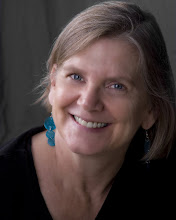
I was supposed to fly out this morning but the airline cancelled the flight. I'll leave tomorrow
late afternoon--and it's a good thing. We've been working eight hours a day on the manuscript but definitely can use today and tomorrow to finish up.
Thank you blizzard.
In my last post I said stuff comes up while editing. Indeed. A cousin of the author's snailed some rich material that arrived since I've been here--a series of letters we hadn't seen, a diary from 1907 written by one of the characters in the book we knew almost nothing about, except that she died young, leaving five children behind. We also learned of another store employee who is still alive: Winnie Risk is 93. I finally reached her by phone and got a great interview. This needs to go in. The new material triggers changes in what's there. Oh, it's so much fun, editing. Really.
And as we read over the book--we sit facing each other (we both have hard copies) at a card table taking turns reading chapters--I see areas that need help. So does he. Yippee for the extra time.
The only bummer. The Patriots have to play today in this. But they're 9 - 0 in snow. Go Pats!
We might even have time to watch some of the game.

